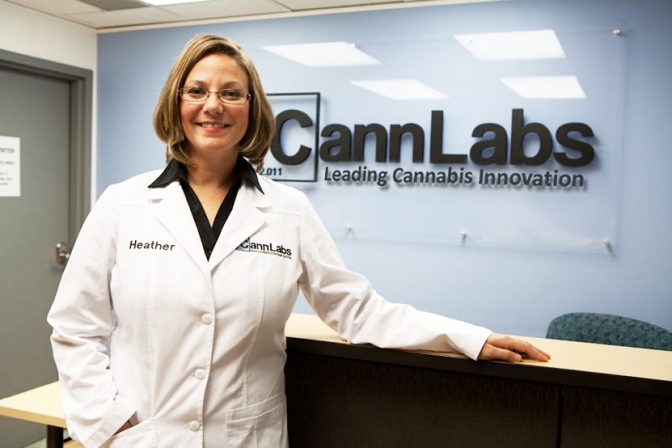ADVANCED CANNABIS SCIENCE: Women Leading in the Laboratory

By Dr. Jahan Marcu
These days, women are not just cannabusiness executives, but true leaders in technology development, consumer safety and implementing regulations. Here are profiles of three female members of the American Chemical Society (ACS) Cannabis Subdivision, which, among other things, hopes to guide young scientists into the marijuana workforce. The ACS is the largest and oldest chemists’ society in the United States.

Melissa Wilcox
Quality Control
Melissa Wilcox is Marketing Manager at Grace Discovery Sciences in Columbia, Md. and co-founder of the American Chemical Society Cannabis Subdivision. Best known for her work on developing next-generation universal evaporative light-scattering detectors, she turned techniques such as flash chromatography into workhorses of the natural products world. Specifically, Wilcox has adapted flash chromatography to obtain reliable testing values from cannabis edibles—gummies, brownies, soda, pasta sauce and extracts.
How did a conservative specialty materials company like Grace Discovery Sciences, whose products usually cater to more traditional industries like pharma and biotech, enter the cannabis arena?
Wilcox says she was “driven to see if our technology could be applied to cannabis analysis, or cannabis applications in general. The other thing is that I’ve always been interested in plants like cannabis and the science behind them. Cannabis is really an extension of the natural products industry. But this is a little more complicated due to its Schedule I status.”
Wilcox believes organizations such as the American Chemical Society, AOCS (American Oil Chemists’ Society) and others are going to help ensure product safety and quality, and guide states and maybe even the federal government to create sensible policies and regulations for these products.
Beginning a career with professional training is key, Wilcox insists. “It certainly helps to have a background in pharmacognosy,” she says. “If your goal is to analyze cannabis or other natural products, having degrees is certainly going to help. There are a lot of good people making sure we have the right methods, tests and quality control in place, so that this industry can grow and flourish without harming anyone in the process.”

Heather Despress
More Than a Lab Coat
Heather Despress, a former Lab Director at CannLabs, did her chemistry studies at the University of Colorado at Denver. With a strong analytical chemistry background, Despress hopes her work will spur every state to get on the same page regarding laboratory and testing regulations.
While sitting on Colorado’s Amendment 64 task force, a state deputy attorney general passed her resume along to CannLabs, who hired her. She immediately began pushing the company to validate their methods and become compliant with industry standards, employing state-of-the-art techniques.
“My second day at CannLabs, I asked if we could get rid of everything they were doing and start over,” Despress recalls.
Gender biases in the cannabis industry almost got the best of her at times. At one conference, she says, “an expo guy came to me said, ‘What are you doing here, sweetie? Where’s your bikini? Under your lab coat?’ It was infuriating.
“That doesn’t happen so much now,” Despress continues. “The whole industry is upping its game. We’re seeing a lot more scientific and business conferences with higher expectations.”
She hopes to continue analyzing cannabis, and is planning on attending training in January to become a cannabis laboratory auditor for Patient Focused Certification, an international program offered by Americans for Safe Access.
For young professionals considering a career in cannabis, it helps to have a background in the science of horticulture and genetics. “I get a lot of inquiries from students about what classes to take to work in a cannabis lab,” Despress declares. “I usually suggest going heavy on the analytical chemistry—70% chemistry and 30% microbiology.”

Susan Audino
Reconsidering the Plant
Several years ago, a dispensary contacted physical chemist and psychological therapist Susan Audino. “A friend of my brother said they needed me to work as their quality control,” Audino tells Freedom Leaf. After first spurning the offer, she began researching the plant and attending conferences.
“When I sat with Raphael Mechoulam at a Patients Out of Time conference, that completely changed my idea of cannabis,” Audino says, referring to the legendary Israeli chemist who discovered THC. “Consumers have a right to know what is safe, and this is driving my activity now.”
Audino currently works an assessor for the American Association for Lab Accreditation (A2LA). She’s also a member of the A2LA Cannabis/Marijuana Team and the AOCS Cannabis Expert Review Panel.
Her interests, however, go beyond product safety. As a psychologist, Audino is inspired by the cannabis industry. “How many times in a person’s life is there a movement that is anthropological, social, legal and medical?” she asks rhetorically. “It’s a rare mix in someone’s lifetime. The most rewarding careers are those that typically come with no name, and that you create yourself. My advice is to think outside the box and be open to opportunities.”
Dr. Jahan Marcu is Freedom Leaf’s Science Editor and Director of R&D for Green Standard Diagnostics.
Read the digital edition of our December 2105 issue dedicated to the Women of Cannabis
